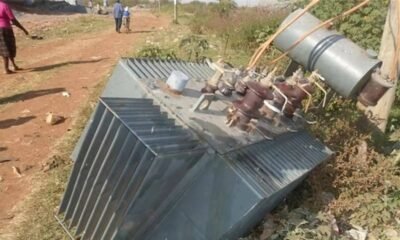News
The Impact Of COVID-19 On Nigeria’s Newsroom (2)

BY OLUFUNMILAYO HABIBAT OBADOFIN
Regardless of the pandemic, the situation of shrinking press power has not doused down but rather has taken a new dynamic with the pandemic. An impingement to the work of the Nigerian Journalist that has been underreported is the direct and indirect censorship of some of the Covid-19 news updates.
One of these is the action of the Nigerian Federal Government in its decision to suspend over 80 journalists from accessing the presidential villa.
The Committee for the Protection of Journalist, CPJ reported that presently only 16 journalists both from private and public media outlets are allowed to the Villa. Although the action may be described to be in compliance with the social distancing policy, it could affect the efficiency and promptness of the suspended media outlets in providing Nigerians with a direct update on the Federal Government efforts against COVID-19.
Newsroom 1
n lieu of the suspension, a rotating schedule with more numbers of journalists, and the provision of more safety equipment to journalists could have been adopted.
Notwithstanding the increase in responsibilities and lesser pay cum labor, it is noteworthy to say that the Nigerian journalists have done remarkably well, in carrying out their constitutional responsibilities during this period.
Most of the broadcast stations have managed to sustain a series of informative programs both related to and outside the Covid-19 updates. Also, a lot of TV advertisements have been modified to fit the current realities. One notable achievement by Nigerian journalists is the data-driven report on the Nigerian government conditional cash transfer, a social intervention to reduce the impact of the pandemic on the poorest of the poor.
Newsroom 2
The report provides the Nigerian public with an explicit outlay of the Nigerian government’s conditional transfer during the pandemic, the plight of Nigerians doctors, and other health workers, some challenges faced by journalists during the pandemic amidst other applaudable information. Another is the prompt and regular debunking of fake news, by providing credible information about the Covid-19 virus.
Consequences of a Falling Newsroom
Ravaging the society, alongside the Covid-19 pandemic, is the voluminous fake news otherwise known as infodemic by the WHO. From a UNESCO statistics, in April alone, Facebook flagged 50million pieces of content, twitter challenged over 1.5 million users, while google blocked almost an 18 million scam email on Gmail all related to Covid-19.
These facts have raised concerns over the impact of journalism in combating the peril of fake news and misinformation.
The UN Secretary-General, Antorio Guterres highlighted the essential role of the press in combating fake news in his video message to mark the last World Press free day by his statement “the press provides the antidote; verified, scientific, fact-based news and analysis”
The statement of the UN Secretary-General, reiterates the indispensable role of the journalists in fighting the infodemic. It is therefore important that we promptly and effectively work against any trial such as the current financial downtime that could deter the works of the journalists. Otherwise, the infodemic may overtake the Covid-19 pandemic in scarring the human society.
Newsroom 3
Patently, the press also known as the fourth estate of the realm has played a role as the watchdog of the society in ensuring that duty bearers are accountable and as much as possible run a transparent and inclusive system with right holders.
There have been countless testimonies to this end, most remarkable; the transition from a dictatorship regime to a democratic government, and forging further to preserve the inherent features of the democratic system.
A continuous financial mess as we currently hold of the fourth estate would not only reduce the manpower and efficiency of the fourth estate but may as well lure whoever is left off or hurt from the financial tornado into a dirty compromise with any duty bearer willing to geese the palms. Hence a looming fear that the watchdogs are converted into pet dogs.
Furthermore, an unchecked stiffening of the press would deter the public from knowing and making sense of government activities, policies, and societal development especially as it affects them. Conjointly, the press begins to lose its relevance and vigor for which it is built.
Saving the Falling Newsrooms
The present financial jeopardy of newsrooms must be met with a hybrid of both local and global financial intervention to journalism and the media.
Presently the Central Bank of Nigeria has committed a 500billion naira (3.3 billion dollars) to the aviation industry and spent over 3trillion naira in the last 8 years bailing out banks according to an investigation by the Daily Sun. Similarly, such benevolence should be extended to the news and media industry.
Newsroom 4
Legal frameworks and actions that stiffen the freedom of the press should be knocked-off, whilst encouraging a more cordial relationship between the journalists and security officers.
Beyond the rhetorics, government ministries, departments, and agencies should support and ensure that journalists are granted quick and easy access to information at all times.
READ ALSO: Anxiety Heightens Amongst Commuters On Lagos Badagry Road
Outwith the pandemic, the Nigeria Union of Journalism must institutionalize and enforce a substantial and clever welfare scheme for its members. This inter alia includes better remuneration, research allowance, and hazard allowance. Media outlets should also explore the option to launch and/or improve their online presence to retain readership and advert.
-Concluded
This Outbreak story was supported by the Pulitzer Center and Code for Africa’s WanaData women data science initiative



























